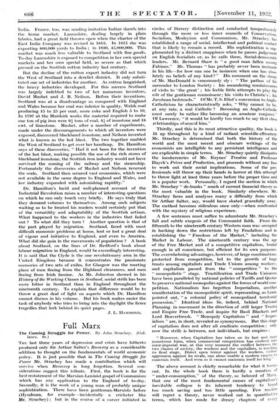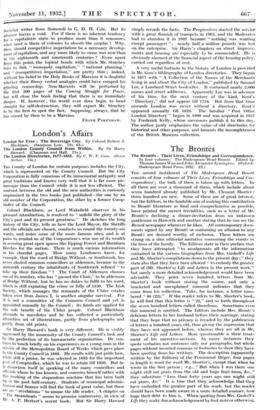Full Marx
The Coming Struggle for Power. By John Strachey. (Gol- lancz. 9s.)
THE last three years of depression and crisis have hitherto produced only Sir Arthur Salter's Recovery as a considerable addition to thought on the fundamentals of world economic policy. It is just possible that in The Coming Struggle for Power Mr. Strachey has made a contribution which will survive when Recovery is long forgotten. Several con- siderations suggest this tribute. First, the book is far the best restatement of the Marxian-Leninist gospel of Communism which has any application to the England of to-day. Secondly, it is the work of a young man of probably unique sophistication. There have been gentleman-Marxists before (Hyndman, for example—incidentally a cricketer like Mr. Strachey) ; but in the course of a career initiated in circles of literary distinction and, conducted tempestuously through the more or less inner councils of Conservatism, Socialism, Mosleyism and Communism, Mr. Strachey has established a range of social, intellectual and political contact
that is likely to remain a record. His sophistication is sup-
plemented by a distinct snappiness when he passes judgement on English Socialists or, as he calls them, Social-democratic leaders. Mr. Bernard Shaw is " a good man fallen among Fabians." Mr. Thomas " has probably never been insincere in his life—for how can one be insincere when one has absa. lutely no beliefs of any kind ?" His comment on the decay
of Mr. MacDonald is venomously sly : " The pathos of his
surrender to London Society : his meandering reminiscences of visits to `the great' ; his feeble little attempts to play the role of the gentleman connoisseur; his visits to Christie's ; his
Jacobean bedsteads." Of Mr. T. S. Eliot's conversion to Anglo- Catholicism he characteristically asks, Why cannot he be, at any rate, a real Catholic ? Becoming an Anglo-Catholic must surely be rather like becoming an. amateur conjurer:' Of Lawrence, " it would be hardly too much to say that class relationships obsessed him."
Thirdly, and this is its most attractive quality, the book is lit up throughout by a kind of radiant scientific effrontery Mr. Strachey is determined that both the history of the world and the most recent and obscure writings of the economists are intelligible to any persistent intelligence and are explicable in simple terms. Mr. Strachey quietly dissipates the incoherencies of Mr. Keynes' Treatise and Professor flayck's Prices and Production, and proceeds without any fuss to work out their social implications. Some of the pro- fessionals will throw up their hands in horror at this attempt to throw light at least three years before the proper time and in a popular work. Personally, I regard the section in which Mr. Strachey de-bunks " much of current financial theory as the most valuable in the book. Similarly elsewhere. Mr. Strachey faces and analyses many a difficulty from which Sir Arthur Salter, say, would have skated gracefully away. The method becomes ridiculous once only—when confronted with the mystery of religious experience.
A few sentences must suffice to adumbrate Mr. Strachey's full and subtle exegesis of the Communist faith. From the
fifteenth to the nineteenth century Western man was occupied in hacking down the restrictions left by Feudalism and in establishing the " Freedom of the Market," including the Market in Labour. The nineteenth century was the age of the Free Market and of a competitive capitalism, brutal enough in all conscience, but efficient for its own purposes. The overwhelming advantages, however, of large combinations, protected from competition, led to the growth of huge trusts among capitalists and Trade Unions among workers ;
and capitalism passed from the " competitive " to the " monopolistic " stage. Trustification and Trade Unionism have been paralleled by national policies of Tariffs and Quotas to preserve national monopolies against the forces of world com- petition. Nationalism has begotten Imperialism, another manifestation of the monopolistic spirit, representing, as Lenin pointed out, " a colonial policy of monopolized territorial possession." Identical ideas lie, indeed, behind National Planning (a movement in the direction of still larger Trusts) and Empire Free Trade, and inspire Sir Basil Blackett and Lord Beaverbrook. " Monopoly Capitalism " and " Imper- ialism " are, in short, revealed as synonymous. But this stage of capitalism does not after all eradicate competition ; only now the strife is between, not individuals, but empires :
" Moreover, when Capitalism has taken on its last and most monstrous form, when commercial competition has evolved into inter-imperial war, at this very moment the conflict between the two classes of society, the workers and the capitalists, is reaching its final stage. Direct open terror against the workers, violent aggression against its rivals, can alone enable a modern empire to maintain itself. And even so it cannot maintain itself for long.'
The above account is chiefly remarkable for what it leaves out. In the whole book there is hardly a mention of " under-consumption," of the theory, so beloved of Mars, that one of the most fundamental causes of capitalism's
inevitable collapse is its inherent tendency to breed too much saving- and - too little spending. Few readers will regret a theory, never worked out in quantitative. terms, - which - has made for - dreary chapters of every socialist writer from Sismondi to G. D. H. Cole. But its absence leaves a void. For if there is no inherent tendency forfora capitalistic state to produce more than it consumes, what need is there of colonies to absorb the surplus? Why, then, should competitive imperialism be a necessary develop- ment of capitalism, and any more likely to cause war now than in the eighteenth and nineteenth centuries ? Even apart front this point, the topical bonds with which Mr. Strachey tries to link " monopoly capitalism," " national planning," and " (competitive) imperialism," are pretty thin ; indeed, without his belief in the Holy Books of Marxism it is doubtffil whether their flimsy verbal analogies could have escaped his grinding censorship. Non-Marxists will be perturbed by the first 200 pages of the Corning Struggle for Power, but will close the book feeling that there is no immediate danger. If, however , the world ever does begin to head straight for- self-destruction, they will expect Mr. Strachey to be the first to spot the fact. Supposing, always, that he has ceased by then to be a Marxian.
FRANK PAKENHAM.































 Previous page
Previous page